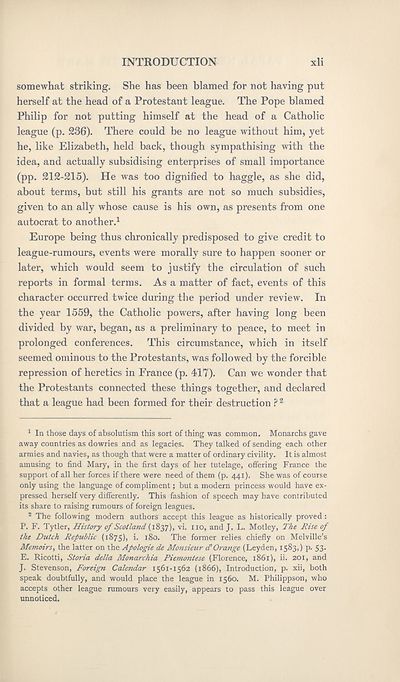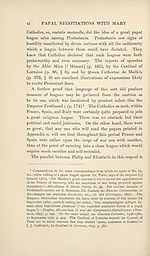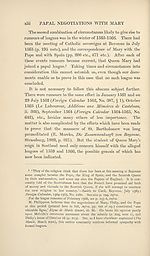Series 1 > Papal negotiations with Mary Queen of Scots during her reign in Scotland, 1561-1567
(46) Page xli
Download files
Complete book:
Individual page:
Thumbnail gallery: Grid view | List view

INTRODUCTION
xli
somewhat striking. She has been blamed for not having put
herself at the head of a Protestant league. The Pope blamed
Philip for not putting himself at the head of a Catholic
league (p. 236). There could be no league without him, yet
he, like Elizabeth, held back, though sympathising with the
idea, and actually subsidising enterprises of small importance
(pp. 212-215). He was too dignified to haggle, as she did,
about terms, but still his grants are not so much subsidies,
given to an ally whose cause is his own, as presents from one
autocrat to another.1
Europe being thus chronically predisposed to give credit to
league-rumours, events were morally sure to happen sooner or
later, which would seem to justify the circulation of such
reports in formal terms. As a matter of fact, events of this
character occurred twice during the period under review. In
the year 1559, the Catholic powers, after having long been
divided by war, began, as a preliminary to peace, to meet in
prolonged conferences. This circumstance, which in itself
seemed ominous to the Protestants, was followed by the forcible
repression of heretics in France (p. 417). Can we wonder that
the Protestants connected these things together, and declared
that a league had been formed for their destruction ? 2
1 In those days of absolutism this sort of thing was common. Monarchs gave
away countries as dowries and as legacies. They talked of sending each other
armies and navies, as though that were a matter of ordinary civility. It is almost
amusing to find Mary, in the first days of her tutelage, offering France the
support of all her forces if there were need of them (p. 441). She was of course
only using the language of compliment; but a modern princess would have ex¬
pressed herself very differently. This fashion of speech may have contributed
its share to raising rumours of foreign leagues.
2 The following modern authors accept this league as historically proved:
P. F. Tytler, History of Scotland (1837), vi. no, and J. L. Motley, The Rise of
the Dutch Republic (1875), i. 180. The former relies chiefly on Melville’s
Memoirs, the latter on the Apologie de Monsieur d'Orange (Leyden, 1583,) p. 53.
E. Ricotti, Storia della Monarchia Piemontese (Florence, 1861), ii. 201, and
J. Stevenson, Foreign Calendar 1561-1562 (1866), Introduction, p. xii, both
speak doubtfully, and would place the league in 1560. M. Philippson, who
accepts other league rumours very easily, appears to pass this league over
unnoticed.
xli
somewhat striking. She has been blamed for not having put
herself at the head of a Protestant league. The Pope blamed
Philip for not putting himself at the head of a Catholic
league (p. 236). There could be no league without him, yet
he, like Elizabeth, held back, though sympathising with the
idea, and actually subsidising enterprises of small importance
(pp. 212-215). He was too dignified to haggle, as she did,
about terms, but still his grants are not so much subsidies,
given to an ally whose cause is his own, as presents from one
autocrat to another.1
Europe being thus chronically predisposed to give credit to
league-rumours, events were morally sure to happen sooner or
later, which would seem to justify the circulation of such
reports in formal terms. As a matter of fact, events of this
character occurred twice during the period under review. In
the year 1559, the Catholic powers, after having long been
divided by war, began, as a preliminary to peace, to meet in
prolonged conferences. This circumstance, which in itself
seemed ominous to the Protestants, was followed by the forcible
repression of heretics in France (p. 417). Can we wonder that
the Protestants connected these things together, and declared
that a league had been formed for their destruction ? 2
1 In those days of absolutism this sort of thing was common. Monarchs gave
away countries as dowries and as legacies. They talked of sending each other
armies and navies, as though that were a matter of ordinary civility. It is almost
amusing to find Mary, in the first days of her tutelage, offering France the
support of all her forces if there were need of them (p. 441). She was of course
only using the language of compliment; but a modern princess would have ex¬
pressed herself very differently. This fashion of speech may have contributed
its share to raising rumours of foreign leagues.
2 The following modern authors accept this league as historically proved:
P. F. Tytler, History of Scotland (1837), vi. no, and J. L. Motley, The Rise of
the Dutch Republic (1875), i. 180. The former relies chiefly on Melville’s
Memoirs, the latter on the Apologie de Monsieur d'Orange (Leyden, 1583,) p. 53.
E. Ricotti, Storia della Monarchia Piemontese (Florence, 1861), ii. 201, and
J. Stevenson, Foreign Calendar 1561-1562 (1866), Introduction, p. xii, both
speak doubtfully, and would place the league in 1560. M. Philippson, who
accepts other league rumours very easily, appears to pass this league over
unnoticed.
Set display mode to:
![]() Universal Viewer |
Universal Viewer | ![]() Mirador |
Large image | Transcription
Mirador |
Large image | Transcription
Images and transcriptions on this page, including medium image downloads, may be used under the Creative Commons Attribution 4.0 International Licence unless otherwise stated. ![]()
| Scottish History Society volumes > Series 1 > Papal negotiations with Mary Queen of Scots during her reign in Scotland, 1561-1567 > (46) Page xli |
|---|
| Permanent URL | https://digital.nls.uk/126971685 |
|---|
| Attribution and copyright: |
|
|---|
| Description | Over 180 volumes, published by the Scottish History Society, containing original sources on Scotland's history and people. With a wide range of subjects, the books collectively cover all periods from the 12th to 20th centuries, and reflect changing trends in Scottish history. Sources are accompanied by scholarly interpretation, references and bibliographies. Volumes are usually published annually, and more digitised volumes will be added as they become available. |
|---|


